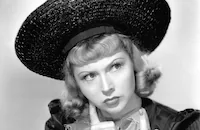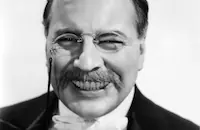Elsa Maxwell's Hotel for Women
Brief Synopsis
Cast & Crew
Gregory Ratoff
Ann Sothern
Jean Rogers
Lynn Bari
June Gale
Joyce Compton
Film Details
Technical Specs

Synopsis
Marcia Bromely arrives at The Sherrington, a New York City hotel for women. Marcia, fresh from Syracuse, has come to New York to marry her old boyfriend, Jeff Buchanan, an architect with Craig and Company. At dinner that night, Jeff tells Marcia that he cannot get married at this time, that he must be social to get ahead, with no ties. After returning to The Sherrington, Marcia prepares to go home to Syracuse when she meets two of her neighbors, models Ellen Connelly and Nancy Prescott. Unable to get a train home until the next day, Marcia agrees to help Ellen out on a double date with two South American millionaires. At the Pelican Club, Jeff, on a date with Melinda Craig, his boss's daughter, becomes upset at seeing Marcia with another man. After dinner, Marcia is introduced to Joan Mitchell, a top fashion model. Both Joan and Ellen have been models for years and recognize that their time is almost up. Joan wants to get married, while Ellen seeks a career on the stage. Marcia, wanting to stay in New York, asks about becoming a model herself. While the women at first discourage Marcia, Ellen eventually offers to take her to her agent, McNeil. McNeil is immediately taken by Marcia and sends her to audition for a Cambridge Cigarette ad. Despite her inexperience, Marcia gets the job, much to the chagrin of Barbara Hunter, another model living at The Sherrington. Out to dinner with her new boss Stephen Gates, Marcia is introduced to columnist Ben Ritchie as the new Cambridge Girl, much to Jeff's chagrin. Society hostess Elsa Maxwell has a cocktail party at The Blue Room, where Marcia is introduced to John Craig, Jeff's boss. Both Jeff and Barbara, who is Craig's mistress, are upset at Craig's attention to Marcia. Craig leaves Barbara behind, taking Marcia back to his apartment to see his "primitive" weapons. Jeff and Melinda show up at Craig's, breaking the mood. Back at The Sherrington, Marcia is confronted by Barbara, who tells her to stay away from Craig, that she has "invested too much time in him." At the Vogue Magazine studios, Jeff sneaks in to see Marcia, asking her to take him back. She refuses, saying he is in love with her new image, not her. Back at Craig and Company, Jeff confronts his boss about Marcia and quits his job when Craig refuses to stop seeing her. While Jeff watches from the street, Craig and Marcia have dinner in his apartment. Just as Craig offers to set Marcia up as his mistress, Barbara arrives. Drunk, she tells Marcia off and pleads her love to Craig. When he refuses to take her back, Barbara shoots Craig. The police arrive, and Jeff runs up to the apartment to find Marcia, who refuses to reveal who shot Craig. Jeff, to save Marcia, confesses to the crime. Still alive, Craig is confronted by his daughter, who tries to force him to name Barbara to save Jeff. Instead Craig tells the police the shooting was an accident, and threatens to go to the district attorney if they do not support his story. The Craig shooting becomes front page news and costs Marcia her modeling career. In the lobby of The Sherrington, reporters mob Marcia. Jeff takes Marcia away with him as Elsa holds court for the reporters. As Jeff and Marcia drive off together, the telephone operator tells a caller that "Miss Bromely has checked out."

Director

Gregory Ratoff
Cast

Ann Sothern

Jean Rogers
Lynn Bari
June Gale

Joyce Compton
Elsa Maxwell

James Ellison

John Halliday

Katharine Aldridge

Alan Dinehart

Sidney Blackmer

Linda Darnell
Ivan Lebedeff
Helen Ericson
Dorothy Dearing
Barnett Parker
Lillian Porter
Frances Leslie
Ruth Terry
Kay Griffith
Irma Wilson
Brewster Twins
Alice Armand
Kay Linaker
Charles Trowbridge
Hal K. Dawson
Helen Brown
Amanda Duff
Chick Chandler

Gregory Gaye
Charles Wilson
Herbert Ashley

Mary Healy
Crew
David Buttolph
Richard Day
William Drake
Raymond Griffith
Roger Heman
Arthur Von Kirbach
Sidney Lanfield
Thomas Little
Louis Loeffler
Peverell Marley
Elsa Maxwell
Elsa Maxwell
Kathryn Scola
Kathryn Scola
Fred Spencer
Gwen Wakeling
Darrell Ware
Joseph C. Wright
Darryl F. Zanuck

Film Details
Technical Specs

Quotes
Trivia
Notes
The film is also known under the alternate title of Hotel for Women. In the film's opening credits, Ann Sothern, Jean Rogers, Lynn Bari, June Gale, Joyce Compton and Elsa Maxwell are identified by their room numbers, not by their character names. Linda Darnell played her first major role in this picture, while society hostess Elsa Maxwell made her screen debut. According to Film Daily, additional scenes were directed by Sidney Lanfield. Materials in the Twentieth Century-Fox Produced Script Collection at the UCLA Theater Arts Library indicate that Nancy Kelly, Warner Baxter, Ray Milland, Jane Wyman, Helen Westley and Elizabeth Palmer were all considered for roles in this production. A Twentieth Century-Fox press release gives the following information about the production: Darryl Zanuck sent writer Kathryn Scola to the Barbizon Hotel in New York City for two weeks to develop the idea of this film. Elsa Maxwell was originally hired as the technical director for the party sequence, but after meeting with her, Zanuck had her work on the story line with Scola. After the screenplay was written, an "elderly woman" role was adapted for Maxwell, who was so good in the part that it was enlarged. Fox borrowed James Ellison from RKO for the production. The nightclub set was made of moveable sections on wheels, making close-ups easier to block and light. Hollywood Reporter reported that one hundred models were brought to Los Angeles from New York for this film. As reported in Daily Variety, a plaigerism suit was filed on 4 June 1941 by Myrtle Louise Stonesifer, professionally known as Louise Howard. She charged that Hotel for Women was adapted from her play Women's Hotel. During the trial, Zanuck claimed that the orginal idea for the film came from Eddie Silverman, president of S and A Film Distributors, in 1938. However, the film's associate producer, Raymond Griffith, said he got the idea from his friend, Virginia Daley. Neither Silverman nor Daley were credited on the film. During the trial, 20th Century-Fox records were presented that claimed the picture, including prints, cost $842,400 to produce, that rentals totaled $862,200, for a net profit of $19,800. The court ruled that Howard was entitled to 20% of the net profits, plus interest, for a total of $4,910.












